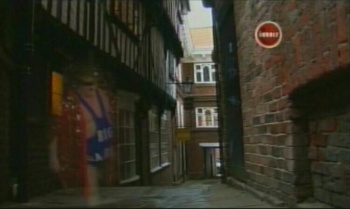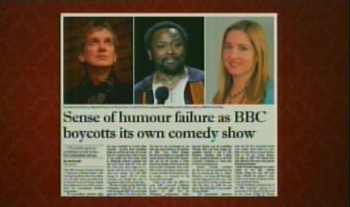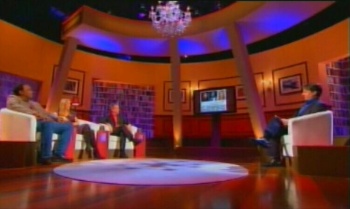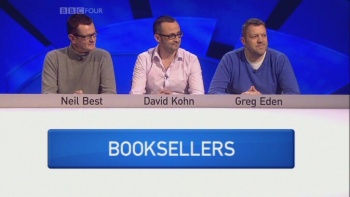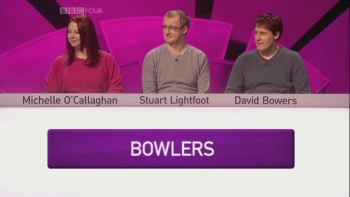Weaver's Week 2010-02-28
Last week | Weaver's Week Index | Next week
Back in the day, Miles Kington used to challenge his readers to identify one story he had completely made up from a set of implausible events. In his memory, we're slipping one – and only one – deliberately untrue "fact" into this week's Week. Is it one of these events?
A) William G. Stewart said that no newsreader has ever made for a good game show host.
B) The Daily Mirror wrote about Only Connect.
C) Jeremy Paxman let fly with the f-word on network television.
D) Richard Bacon is still explaining the rules to 19 Keys.
E) Chris Evans believes a good game show involves a clock.
Contents |
The Bubble
Hat Trick for BBC2, 10pm Friday
The basic concept of The Bubble is almost identical to Kington's little quizette. Take three celebrities, lock them in a house somewhere in the middle of nowhere, and leave them alone with no telephone, no internet, no newspapers, no television. Then, a few days later, bring them out and ask them to discern real news events from some that have been completely invented. This show just about falls under the definition of quiz because each panellist decides for themself where the truth lies, points are awarded, and a winner is declared. As we'll quickly see, it's not actually a quiz but a very clever real-life satire on news and the news media.
The show opens with a handful of news reports that might have appeared on regional news, and the panel is challenged to work out which is the most likely to have been actually broadcast by television. Round two does something broadly similar, except with mocked-up newspaper articles. Only one of these clippings is true, and the contestants have to work out which one. There are some quicker questions – can the panel tell the difference between assassins on a mission or Antan Dec setting up a stunt? The final round invites them to assess the truth or otherwise of various stories that the host reads out in brief.
As a worked example, here are the clips from week one: the ghost of Big Daddy appearing in York; policemen being prohibited from flying their really small CCTV cameras; and party politics finding an outlet on a web forum. Big Daddy was plausible, it's the sort of thing that local news would find useful to fill three minutes of their show, even if it turned out to be nothing more than an unsubtle puff piece for the commercial ghost walks in the city. The flying cameras was also plausible, being a bit of a twist to the "unreasonable restrictions on life" meme that seems to be common in society. Contestant Frank Skinner correctly pointed out that this clip also contained a talking head that looked real; no-one noticed that the report didn't question whether increased police surveillance was a good thing, another little confirmatory detail. The internet infiltration story had more obvious flaws – though the technobabble was as almost correct as general journalists get, an assertion that the three main parties were responsible was just that little bit too neat. None of the contestants were fooled by that, but two went for Big Daddy rather than the flying cameras.
Where's the satire in this? To win this game, the contestants have to be able to pick up on the achingly subtle clues, on the sense of whether this clip quite belongs in the television landscape, whether it's something the press would bother to talk about. If the show had been running a few weeks ago, would anyone have believed that a national footballer had briefly succeeded in gagging the press, still less the way the media spent most of the next week talking about the media talking about the things he tried to conceal while the public wondered what all the fuss was about?
The beating heart of The Bubble is the fact that absolutely any old bobbins passes for news these days. Is it going to make people say "oh dear"? It's in. Does it make some of the audience think that they (or the people in the story) are being got at by powers they can't control? It's in. Is it a story more complex than can be explained in three minutes? Not going on. If the presenter were to stop people on the street and ask them about it, would they have an opinion? No? Spike it. Does it fit in the prevailing narrative, like (for instance) Dr. Gordon Brown throwing a piece of fruit at a laminating machine? Print it first, check it's fact later, and when it turns out to be a complete load of citrus invented by comedian Robert Popper, just brush the facts under the carpet.
Maybe that's the reason why BBC News has refused to be involved in the show. They produce reports that differ from the identikit dross churned out by ITN and other providers. The BBC wants to have a reputation for providing credible news, and believes that their efforts would be damaged if they deliberately made spoof footage. Some other rolling news channels are already making programmes that strain the boundaries of credulity to breaking point, such as the assertion that it's ever acceptable to put Kay Burley on air. Don't try this at home, kids.
We have to point out that this satire only works for viewers who have been following the news. People who don't read a quality newspaper, or listen to the radio broadcasts, or know their Sophie Raworth from their Sophie Aldred, will be in the dark just like the celebrities. For some people, The Bubble isn't a satire, but a game they can play at home.
Like David Mitchell's other entertainment, Radio 4's The Unbelievable Truth, The Bubble challenges celebrities to spot the needles of fact in a haystack of balderdash and bunkum. Some of the nonsense is clearly wrong, some is actually very credible, though we have a distinct suspicion that the quiz element is only there to spark off discussion from the celebs. Even so, the format has more versatility than evident in recent years of Hat Trick's other topical quiz, Have I Got That Clip of Alan Sugar Discussing the Recession For You.
Two things will keep us interested in this format. First, what happens when the panel is confronted with a completely ludicrous but true story, even more bizarre than K-Factor judge Sheryl Cole ditching her husband Old King by SMS message this week. We can surmise that they won't ever discuss natural or man-made disasters, this is a comedy show, but other celebs making fools of themselves are right in their crosshairs. And second, will we retain our 100% record on the television fakes? When that goes, we'll be annoyed for a moment, but impressed by the producers.
University Challenge
Elimination Quarter-Final 2: Edinburgh v Jesus Oxford
In the BBC revival, there's never been a 32nd game in a series. The six series ending in the 1990s all lasted for 27 games, the series in the aughts were stretched to 31 matches. Thanks to the new format – this is the eighth of ten quarter-finals – there are 37 games in this series. It's still shorter than the last two years of the ITV series, which included such genius ideas as a best-of-three final, the Pass the Baton shows, and the winners playing the New Zealand champs. Two of those three ideas deserve a revival.
Playing this week are Edinburgh – who lost to Imperial last time – and Jesus Oxford, defeated by Emmanuel Cambridge. It's Edinburgh who kick us off with the Shape of the Week, cross, and go on to receive a set of bonuses on the produce of monasteries. The only one they get is beer. Jesus do well on their one set of bonuses, and before we know it, we're into the first visual round. It's maps showing military operations in the Second World War, and begins with something that looks like the opening titles to Dad's Army. Edinburgh has a slim lead, 45-40.
Edinburgh start off well with a set of bonuses on unfinished buildings, but don't quite bother to finish them all off. They then get the wordplay starter of the week, words that could be indicated on Only Connect by PCK; they do less well on commonly-confused words. At least they're getting something: Jesus finds it difficult to pick up a single starter in this quarter, just the one before the audio round, and they draw a blank on questions about chemistry that they reckon they should get. That audio round is on television theme tunes, but none of the panelists can remember the theme from The Saint, and Edinburgh leads 110-50.
We muttered last week that no-one knew the dictatorship of the proletariat, but anarcho-syndicalism is part of Jesus's knowledge. It's this Billy Shakespeare chap who the teams don't know, with phrases coined for "The Tempest" eluding them all, and giving Jesus a missignal. The Oxford side proves remarkably adept at lines of latitude and longitude, but then there is a huge list of dropped starters. Thumper reels off a long list of numbers, which has us wondering if that's numberwang. It's not, it's the visual round, self-portraits, and Edinburgh stretches their lead to 140-90. It had been down to twenty points at the dropped starters.
Abbreviations in reverse prove a quick 15 points for Edinburgh, Jesus do almost as well on deposed kings, and they're 55 behind with five minutes to play. Does Edinburgh know what ERNIE stood for in connection with premium bonds? They do, and they probably know that he drove the fastest milkcart in the west. Iceland turns up for the second time tonight, both times on bonuses for Jesus. Elements in reverse atomic number? That's the sort of mean trick they'd play on Only Connect, but holds no fear for Jesus.
They're 40 points behind with less than two minutes to go, but are interrupting the bonuses and picking up some good starters. 3/4 was 40 old pence, Jesus get one bonus wrong, the next right, and the gong goes. It's 185-185, we have a tie, and a tie-break is needed.
The determinant of a matrix in your head? Good grief! Andrew Matheson picks it up for Edinburgh, and they've snuck through for the win. Max King's four starters were the most for Edinburgh, who went 15/33 on the bonuses. Five for Tom Speller of Jesus, his side went 18/29 with one missignal. The overall accuracy rate was 54/89.
Next match: (FQF1) Winner EQF2 v Manchester
Followed by: (BAA5) Sheep giving birth
Later: (FQF2) Girton Cambridge v Imperial London
Then: (SF1) St John's Oxford v Winner FQF2
Followed by: (SF2) Emmanuel Cambridge v Winner FQF1
After: (F) Winner SF1 v Winner SF2
Only Connect
Heat 8: Booksellers v Bowlers
"The show described by the Daily Mirror as weird," says Victoria, before giving the rules. In the interests of accuracy, the exact quote is "Maddest quiz show on television" (Jim Shelley, 11 January 2010). So, just how mad is the maddest quiz show on television? Ooh, utterly. We'll hear some questions, and if they get the answers right, they get points. At the end of the quiz, whichever team has the most points, they're the winners. Remember, the last game show coming out of the Daily Mirror was all about catching a deadly disease, and that is an entirely sane idea. On the other hand, how utterly cool is it that a tabloid newspaper is reporting on Television's, er, Maddest Quiz?
On with the show: the Booksellers are people who work at the head office of a national book store, and point out that Victoria's poker autobiography has been flying off the shelves and into the back rooms. The Bowlers are fans of retro bowling alleys, which they describe as the most respectable sport with a bar nearby.
The Booksellers won the toss and elected to receive. Will we judge them harshly for going for it on Joseph Dredd and the creator of Beavis and Butt-head? Not really, it's two points. The Bowlers need to see three clues, each of them identifying one man, and that's two points for them. Booksellers pick the audio set, and get Hendrix, Lennon, and then they go for it with half the time left. Posthumous number one hits is their offer, it's right for three points! Barking!
Bowlers have a set that's as long as it could possibly be, but pick up one more point than if they had seen all the clues they could possibly see. The Booksellers have the flag of Pakistan, Abba, the Tardis, and the last one would have been radar. They're all acronyms, Pakistan taking its name from the initials of Punjab, Afghan, Kashmir, Sind, and the suffix of the word Balochistan. Two points! The Bowlers get the last set, including "Next to Cary Grant on a bus", and go for places of murders in Hitchcock films. Close, but no cigar; the Booksellers pick up a cameo bonus. The Booksellers lead, 8-4.
Round two, what comes fourth? Booksellers kick us off again, and instantly get the connection is characters in Trainspotting. They go for it on three points, but are wrong to do so, and yield a point to the Bowlers. Victoria tells us of the time she went to see It's a Wonderful Life with Irvine Welsh, and he cried. Bowlers pick up that the next link is card names in French, and the ace is "as"; a bonus back for Booksellers. 02:43:38, 03:49:05, 04:54:33 – it's not a numerical sequence, says one of them. They have a shot in the dark. It is a numerical sequence, and it's 06:00:00, as the Bowlers tell us. Also times when the hands of a clock form a straight line, and how mad is that!
Green man, amber — what could come fourth in such a sequence? Red and amber together, which sadly isn't indicated by Red Adair holding a semi-precious resin. Two points. Booksellers pick up on the next link: largest trade unions, but that goes across for a bonus. Bowlers have positions in netball, discuss for as long as they can, but don't bother to have a goalkeeper. After all the to-ing and fro-ing, it's the Bowlers who lead, 10-9.
It's the Bowlers who are first to the Connecting Walls, the greatest walls in quiz shows since the Wonderwall. Private schools are the first set they get, then they spend a long time jabbing on corners at Silverstone. Instead, they pick up things to do with Westminster, then it's Silverstone, and finally some of the livery companies of the City of London. With over a minute to play, that's perfection from the Bowlers. Ten points!
Though they don't know it, The Booksellers have a long way to go with their wall. They begin with a set of Lanes in London. They're not seeing the lawmakers, but do get that Park is a Lane, one to land on. There's a set of terms in bowls, and then the team start on the laws. The final link is hymn writers, something the team was muttering about during play. They've not heard of Gresham's law, bad money drives out good; nor Sturgeon's law, 90% of everything is rubbish, so 10% of Wikipedia is accurate. Six points! Bowlers have the lead, 20-15.
Noel Coward kick off the Missing Vowels quickfire finale, that breaks 2-1 to the Bowlers. Women involved in political scandals is a perfect four for the Booksellers, then African nations breaks 2-0 to them. Characters in "The Loon Show"... sorry, "The Goon Show" is a tricky one, 1-0 to the Bowlers. It's the end of the round, the end of the contest, and the Bowlers pipped their opponents by 23-22. Bonkers!
Sanity returns in the quarter-finals, with Archers Admirers v Exeter Alumni
Mastermind
Heat 19
These four people are about to take the toughest test on television, says the host. Er, no, that would be the Surely Impossibly Way of the Warrior, now with four successes in 122 attempts. We've had more tie-breaks on this show!
John Iball kicks off tonight. He's taking Charles Darwin (1809-82), a geologist, naturalist, geographer, and biologist. He sailed on the Beagle (1831-6) and proposed that species evolve through natural mutation and survival of the fittest. He's regarded as a noteworthy person, appearing as he does on the back of the ten quid note. The contender is certainly fit with his preparation, and both survives and thrives with 14 (2).
Elspeth Wilkes comes next. She's been swotting up on the Life and Works of Francis Poulenc (1899-1963), a member of Les Six, composing piano pieces that were neither as impressionistic as Ravel nor as atonal as Schoenberg's works. Our contender is a pianist herself, and responds to the questions with promptness, even when that response is a pass. That promptness causes her to interrupt one or two of the more prolix questions (and, like everyone else's, they could use some chopping), finishing on 12 (4).
Gavin Doig tackles the History of Mountaineering on Everest (8848m), the highest mountain in the world. Irvine and Mallory died on the peak in 1924, Bourdillon and Evans failed by a few hundred metres in 1953, but Hillary and Tensing topped the summit a few days later. The Hitch-Hiker's Guide to the Galaxy warns potential climbers that "Mount Everest can be lethal; do not even think of going there until you have done a lot of research." One of the early questions asks after the height of the mountain, but in feet. What are those? Will they be after the circumference in bushels and pecks? Anyway, lots of questions about the climbs, a few about the geography of the mountain, and a final score of 11 (1).
Finally, David Gordon will tell us about the Break Up of Yugoslavia (1918-2003). The theory behind Yugoslavia was that the Slavic peoples of the former Ottoman and Austro-Hungarian Empires had a lot in common and could reasonably form a united nation. Small differences between the various local factions – religious beliefs, enmity between the Serbs and Croats – simmered through the 1930s, were squashed under General Tito, and the country fell apart in 1991-2 as Slovenia, Croatia, (Former Yugoslav Republic of) Macedonia, and Bosnia-Herzegovina all declared independence from the Serb-dominated federal structure. Kosovo achieved de facto independence in 1999 as a UN protectorate, and Montenegro divorced Serbia in 2006. Vojvodina appears stable as a part of Serbia, after the Yoghurt Revolution of 1988. It's a very good round, finishing on 13 (0).
High scores this week, and Gavin Doig seems surprised that he's asked something as simple as what drink Rosie Lee gave her name to. He doesn't remember former Conservative party leader Michael Howard, coming up with someone called Iain Duncan Smith. Whoever he was. The round ends in a bit of a bad way, the final score is 19 (4).
Elspeth Wilkes remembers the inventor of the tuning fork and the career highlight of Ricky Martin. Whoever he was. On questions other than music, her round is as much miss as hit, and the final score is 20 (8). Still, any score of a score is a good score, and we're not knocking.
The top six runners-up:
- John Cooper 29 (3)
- Ian Scott Massie 26 (2)
- Les Morrell 26 (3)
- Colin Wilson 25 (0)
- Peter Cowan 25 (2)
- William de Ath 25 (4)
David Gordon manages to confuse the Buddha with Gandhi, which probably isn't such a huge difference. There's a Hidden Week Indicator of the Week, as one question asks after the show introduced by "College Boy" as played by the Balanescu Quartet. Still inferior to the original, in our view, and Only Connect's theme knocks spots off of it. 18 (2).
John Iball needs seven to win, and gets the old, old question about Peter Blake designing a Beatles album cover. It takes a surprisingly long time for the contender to pass the finish line, there are only two questions left when he does, and finishes on 21 (6).
It's enough to win, a winning score is a winning score, and though it was a low-scoring game, that meant it remained tense right to the end.
This Week And Next
Ratings for the week to 14 February show ITV's Saturday night shows took a knock. Though nothing's coming near Dancing on Ice (9m), the final of So You Think You Can Dance (6m) removed half-a-million viewers from Mr and Mrs and Take Me Out, allowing Total Wipeout (5.15m) to come through and take third place. Popstar to Operastar also moved up, 4.65m is their best yet. We note that a million people left their sofas when The Lottery Corp's advert came on. Wasn't just us, then. University Challenge and Come Dine With Me topped on BBC2 and C4, and Mock the Week recorded its first audience of 3m this year.
A new leader on the digital channels, The Satellite Channel's cheap knockoff Got To Dance was the most seen show on the cable tier, with 1.35m viewers. Come Dine With Me had 1.17m, and Pop Idle Us was reduced to 875,000. Is Victoria Coren more popular than Charlie Brooker? Don't know: Only Connect attracted 340,000 viewers, Newswipe 335,000, and that's on a par with QI repeats on Dave.
Next week, House Guest leaves these shores for somewhere warmer (ITV, 2pm weekdays). The annual festival of song Can i Gymru goes out on Sunday (S4C, 7.30pm), and Feirm Factor is a Welsh original remade in Irish (TG4, Friday). We're looking forward to re-runs of Winning Lines (Challenge, 7pm weekdays) if only for the soundtrack, and Who Dares Wins is back (BBC1, 8.30 Saturday).
So, what was our planted fib? It wasn't the Yoghurt Revolution, that really did happen in 1988. It wasn't University Challenge being taken off air for live coverage of lambing season, that's taking place on 8 March. It wasn't even the crack about Richard Bacon still explaining the rules to 19 Keys – he clearly needs Victoria Coren's Rule Condenser. Everything we've written this week is true, except for the one about 10% of Wikipedia being accurate.
To have Weaver's Week emailed to you on publication day, receive our exclusive TV roundup of the game shows in the week ahead, and chat to other ukgameshows.com readers, sign up to our Yahoo! Group.


